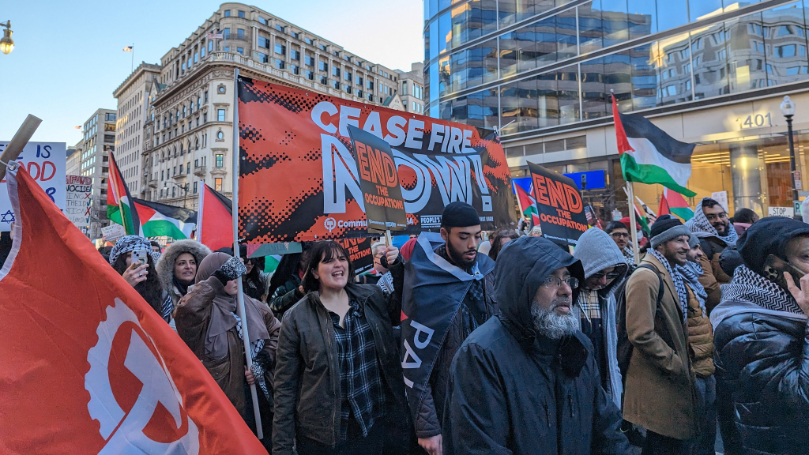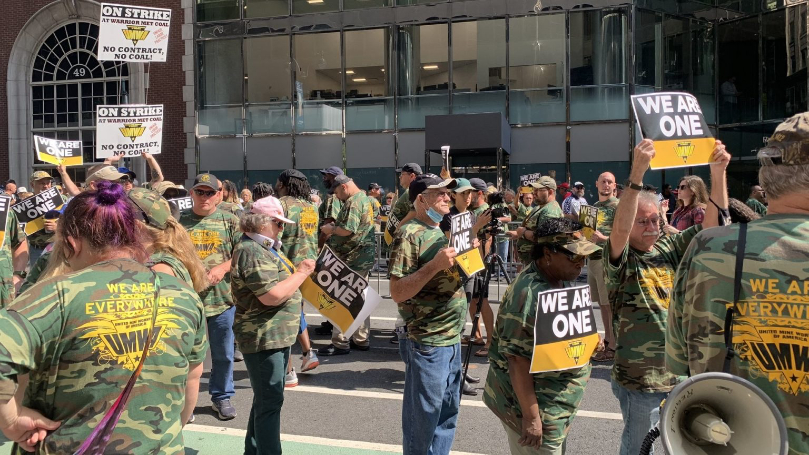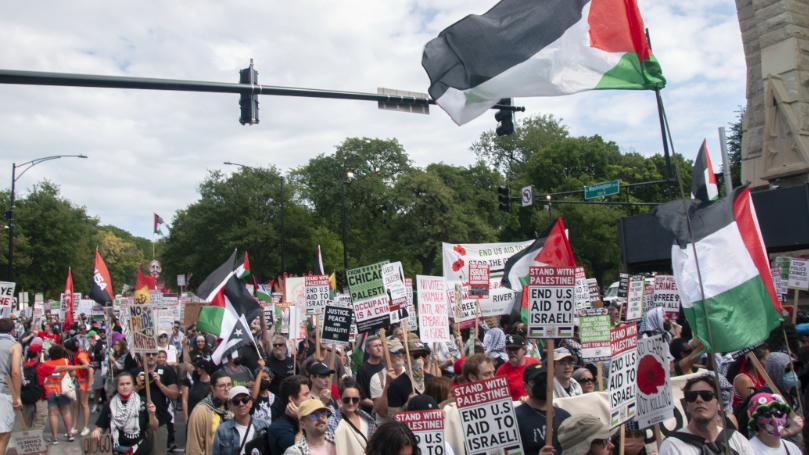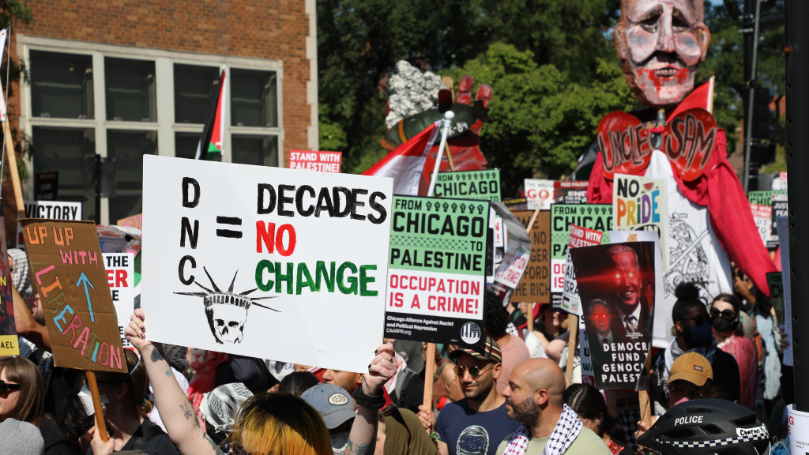
The setback of the Uncommitted Movement at the DNC has exposed the nature of the Democratic Party to many in its base. Some on the left have responded with an “I told you so!” attitude, arguing that the unsuccessful campaign for a bare minimum demand of a Palestinian speaker to take the stage at the DNC illustrates the futility of such approaches. The problem here is that such arguments reek of an almost religious conviction which shuns the unconverted, who “like former sinners now turned evangelists,…tolerate least of all the image of their former selves as reflected in others,” rather than a strategic approach to the working class which seeks to build its consciousness. Yes, we already know that the Democratic Party is a capitalist, imperialist party, we already recognize the need for an independent, working class political vehicle, but we are also already Marxists. And as Marxists, we should be well aware of the ideological apparatus of capitalism that makes alternatives to the existing system seem impossible, rather than forgetting that most have yet to break through this mystification. The working class as a whole has yet to decisively abandon the two-party system, and this is the key issue. Even those who refrain from voting, typically the majority of those eligible, often out of disillusionment with the two capitalist parties, are likewise unconvinced of the viability of an alternative (as shown by the consistent low voter turnout for third party candidates). Our job is not to simply declare our independence as a class because we see the need for it, but to facilitate a real mass movement for the independence of the working class.
The fight for reforms and immediate gains for the working class is a key part of any struggle for socialism. The struggle for democracy is the key means by which the working class sees for itself the real nature of the capitalist system.
The struggle for democracy, which the Uncommitted Movement represented in its attempt to have the peace sentiment of the majority of the Democratic base shape the platform and policy of the Democratic Party, is two-fold. On the one hand, the fight for reforms and immediate gains for the working class is a key part of any struggle for socialism. On the other hand, the struggle for democracy is the key means by which the working class sees for itself the real nature of the capitalist system. The further this struggle is carried, the clearer the contradictions of capitalism become. It makes apparent the fact that it is not corruption, the lack of democracy, the lack of representation, etc. that is the problem with our system, it is the system itself. This Lenin makes clear:
Marxists know that democracy does not abolish class oppression. It only makes the class struggle more direct, wider, more open and pronounced, and that is what we need. The fuller the freedom of divorce, the clearer will women see that the source of their “domestic slavery” is capitalism, not lack of rights. The more democratic the system of government, the clearer will the workers see that the root evil is capitalism, not lack of rights.
This point is instructive. These movements for democracy are exactly the kinds of movements which build the sentiments and conditions to allow for a real, decisive move for the independence of the working and oppressed people in this country from the two-party system. Some on the left have a tendency to forget that what is immediately apparent to us about the nature of capitalism and bourgeois democracy remains much less so to the rest of our class. We cannot build a genuine independence with the few already convinced, nor are we religious devotees simply seeking to save the souls of individuals by converting them to our cause. As Communists, we can’t simply declare ourselves independent and expect the masses to follow us. The conditions for independence must be built, and this fight must be taken up by at least a decisive majority of the people.

Illustrative of this reality was the fiasco of the creation of the Progressive Party in 1948. William Z. Foster argues that “In 1948, the Communists made a partial and disastrous departure from their policy of working within the framework of the two old parties, by the establishment of the independent Progressive Party. The formation of this party was one of the most serious errors made by the Party during the entire period. This isolationist policy…broke up the left-Center alliance in countless unions,” weakening the influence of the left in these spheres. The Progressive Party campaign was unsuccessful, and failed to mobilize the majority of the working class during the Party’s height of membership. This premature approach to independence later hurt the Party during the McCarthy period after the weakening of many of its alliances. Foster emphasized that even with mass working class discontent, “of the five independent, left-wing parties (Communist, Socialist, Socialist-Labor Trotskyite, and Independent socialist), hardly one hundred thousand votes were cast, combined, all over the United States, which obviously is not the total Socialist strength in this country. This shows at a glance that the enormous majority of the workers, insofar as they vote at all, are voting the two old tickets.” We are Marxists, and that means we have to have a sober, realistic assessment of the political reality in which we live. That analysis must be willing to contend with the reality that there is very little difference today from Foster’s piece in 1959. Frustration with this is to be expected. But frustration and the urgency of our moment does not mean we are able to sidestep the painstaking work it will take to build the genuine political independence of the working class.
There are two reactions to our current moment on the left which are popular at this time: the overestimation of the radicalization of the masses, and the underestimation of the ability for us to build the foundations of independence within working class movements as they exist now. Seeing the mass unrest of the people in response to the genocidal foreign policy of the Biden administration has convinced some that the people en masse are ready to bolt from the Democratic Party and the two-party system as a whole, that revolutionary action is imminent. This seems to me to be detached from reality. The organizations which currently represent the political voice of the working class, specifically the union movement, have largely endorsed the Democratic nominee. While many of them, including the UAW, have taken independent positions on foreign policy in a groundbreaking way, calling for a ceasefire or even an arms embargo and an end to the genocide in Palestine, they have come short of declaring themselves separate from the two party system. The reasons for this aside, including the non-socialist character of the unions and the looming fascist danger, this is not unimportant to our analysis of the path to independence. We cannot overestimate the development of our movement and try to condition a premature split, which will only hurt the aims of the socialist movement by isolating the left, whose duty is to build the consciousness of our class through joining with them in struggle.
But on the other hand, you have the position that because these unions and organizations have taken these stances but have largely not declared political independence, that these vehicles and their approaches are obsolete and we must withdraw from these “useless pursuits” to build the left. This, too, is an error. We are witnessing a historic shift in tone and action from the labor movement in the United States in relation to the Democratic Party, with the UAW and other unions denouncing the backing of the genocide in Gaza by the Biden administration and calling for significant shifts in its imperialist policy. Likewise, there has developed a widening gap between the position of the Democratic Party’s base and its leadership, with the Uncommitted Movement being a clear example. If we withdraw from these developments, from these ongoing struggles, we weaken them and shoot ourselves in the foot in the beginnings of the marathon before us. It is our task as Communists to support these shifts, strengthen them, and build the foundations of genuinely independent movements of the working class and oppressed people. It is through carrying on this activity, through participating in the mass movements of working and oppressed people, and through fighting for leadership of these movements, that Communists can raise the class consciousness and organizational/political maturity of the working class movement and its allies.
It is through carrying on this activity, through participating in the mass movements of working and oppressed people, and through fighting for leadership of these movements, that Communists can raise the class consciousness and organizational/political maturity of the working class movement and its allies.
Of course, we know that the Democratic and Republican parties are capitalist parties, which is why the independence of the Communist Party is an essential tool in our approach. We do not strive to “take over” the Democratic or Republican parties, as Foster says, “[t]he CP works upon the theory that it is impossible for the workers to win complete control of either the Democratic Party, or the Republican Party, they being too closely controlled by the monopolists.” Yet, we must also be wherever the working class is. Foster notes that it is “possible for labor, however, to win control of many key sections of the organization, to win some significant political concessions, and to raise important class issues.” Additionally, he outlines that “It is important for progressives to work definitely at building strong worker organization and program inside the Democratic (and where possible, the Republican) Party,” while reminding us that “progressives should actively combat all illusions among the workers and others in the old parties (without making them splitting issues) that the Democratic Party, or may it be the Republican Party, can be won as a bloc by the workers. We must focus the attention of the masses on the eventual perspective of the Labor Party, as their next big step to a mass and class political organization, without rushing into premature, split movements.”
This is the task before us: to continue to build the existing independent movements of working and oppressed peoples, while also working to advance the maturity of working class movements that remain unconvinced of an alternative to the capitalist parties. This we must do while always keeping in mind that we must not strive to generate a split for the sake of our desire for independence alone. We cannot hesitate to lead the working class movement, but we likewise must avoid at all costs the error of leading them into a premature split, which would be disastrous for the movement. Attempting to forge the path for independence without the base, the leaders, and organizations representing the oppressed (the black and brown communities, women, immigrants, LGBTQ+ people, etc.), and the strong foundation of the labor movement, is folly. As Foster reminds us, “when the situation is deemed ready for the formation of the Labor Party, as nearly as possible the whole labor movement must be involved. A characteristic attempt to form the Labor Party without a solid trade-union backing was the Progressive Party of 1948,” which he characterized as a serious error.

There are shifts within some sectors of the labor movement which point to the growing consciousness around the need for the working class to strive for political independence. An example can be found in a recent statement released by the UE General Executive Board which argues that “Working people desperately need an independent political organization, based on a political program that can unite us, which can fight for that platform in the electoral arena — in short, a labor party.” Such statements foreshadow important developments for the movement to achieve the political independence of the working class, but like Foster, the UE statement cautions that “the formation of an effective, independent, working-class labor party will be no easy task; it cannot simply be wished into existence,” adding that “While we move towards our ultimate goal of a labor party, we have to remain conscious of the fact that elections continue to take place and their outcomes impact workers.” This reminds us that there is significant work to be done if we want to see an organically formed, independent, working class political body with the means to fight, organize, and win.
The Fight for a Party of Labor and the Oppressed
A politically independent vehicle of the working class will most likely emerge as a party of labor and the movements of the oppressed. Foster referred to this party as the “Labor-Negro-Farmer Party.” Such a party will not be necessarily socialist in character, as the majority of the working class has yet to be won to socialism, but will nonetheless be an historic advancement for the working class movement in the United States. A party of this sort would be able to pose a genuine alternative to the bought and paid for politics of the two capitalist parties. Communists must play a leading role in its establishment, but should not try to seize such a vehicle outright, lest it end up like our first attempt to do so in the early 1920s which led to years of political isolation.
So how do we get there? This requires a flexible and tactically diverse approach. While maintaining our independence as the Communist Party, Foster highlights that “Past experience shows that many working class organizations will be built up in the process within the ranks of the old parties.” It is our task to support and assist in building those movements, their organizational capacities, and the foundations for their independence. Additionally, there will likely come into being an intermediate sort of organization “between the building of primitive formations within the old parties, and the formation of a definite Labor Party.” Such an organization “could work in complete harmony with their brothers and sisters who had not yet taken similar steps by breaking with the old organization and setting up an independent organization,” while also maintaining its independence from the constraints of the monopoly parties. The Working Families party illustrates a potential manifestation of such an intermediate body.

In concert with building these movements and intermediary organizations in order to win immediate reforms and victories for the working class, we must also see them as a vehicle for sharpening and clarifying the class struggle for the workers and the oppressed. While we can struggle within mainstream politics and win some victories, we also know that the two-party system will fail to realize the needs of the working class in the final instance. Thus, while “bearing in mind the need to avoid useless, harmful, and premature splits,” as Foster cautions, we must work to bring those movements and struggles which face setbacks into our orbit and into the struggle for political independence. We must not let these moments and movements wither away in defeat, but work to sustain them and to grow them to maturity. That is the task at hand if we want to bring about this shift.
The Path Ahead
But we also must not forget the stakes. It is true that we must struggle for democracy in part to reveal to the working and oppressed the nature of capitalism and the two-party system, but we must also not forsake our class under the delusion that repression will engender progress for our movement. As Betty Gannett, a victim of a years long, anti-working class campaign of repression herself, outlines:
Political reaction and the absence of democracy are obstacles to the awakening of the working class and retard the advance of the revolutionary movement. Repression and denial of democracy do not create, as some contend, fertile soil for arousing the people to resist repression…Under terrorist regimes, such as Czarism in Russia and fascism in Germany, it was easier for the monopolies to divide and oppress the people, to implement their reactionary policies and to crush all resistance. For fascism is not the rule of “the functionally useless elements” of society…It is the rule of the most reactionary, chauvinist elements of the monopolies, who resort to a rule of violence and terror to stem the tide of revolution.
Under such conditions…the revolutionary movement [is] set back for long years. That is why the Marxist movement everywhere, from its very inception, joined the battle to realize bourgeois democracy where it did not exist, and to preserve and expand it where it prevailed. And Marxists today reject the “theory” that cold-war tensions, repressions and assaults on the working class inspire it to revolutionary action.”
The fight for independence necessitates that we defend every inch of the limited democratic rights we have won under bourgeois rule, rather than allow our class to sink into further immiseration in hopes they will suddenly arise to the task of revolution. Achieving disillusionment with, and progression beyond, bourgeois democracy for the working class actually requires that such a system is preserved rather than being allowed to decay into open fascism. Additionally, we must not allow business-as-usual politicians to use the further deterioration of bourgeois democracy under a far-right rule to pacify the rising discontent with our system, convincing the people that the only alternative to a fascist program to which we can aspire is bourgeois democracy, thus smoothing over the contradictions which have begun to become apparent to many in their base. This requires us to work to block the advance of reactionary and fascist movements/policies at every level and in every arena if we are to maintain the struggle for a genuine political vehicle for the working class.
Beyond the fight to battle repression and fascism, we must also build our movements. This means continuing to water the seeds of working class independence in the mainstream, assisting dissenting movements within the two-party system, building the labor movement, and building the struggles of the oppressed. Additionally, we must fight for leadership within these movements, fighting against the tendency of liberals to move to the right under pressure. And we must also build the Communist Party: running candidates, disseminating our platform, building our ranks and influence, and making our Party a fighting political home for those working class and oppressed people increasingly disillusioned with our current system. While we all want and need independence, we cannot hope to achieve such a thing without the structures, capacity, power and organized mass support to do so. This is the marathon, and we must be determined to finish.
Images: Ceasefire Now by CPUSA. Coal workers strike at Warrior Met reach third month by peoplesdispatch.org (Creative Commons); DNC protests by Chris Bentley (CC BY-NC-ND 2.0), DNC by CPUSA.


 Join Now
Join Now